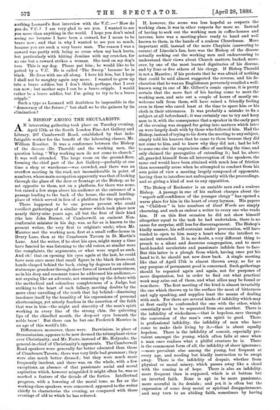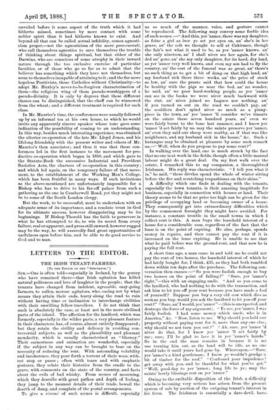A BISHOP AMONG THE SECULARISTS.
AN interesting gathering took place on Tuesday evening, April 17th, at the South London Fine-Art Gallery and Library, 207 Camberwell Road, established by that inde- fatigable worker for the benefit of the labouring classes, Mr. William Rossiter. It was a conference between the Bishop of the diocese (Dr. Thorold) and the working men, the question being, "Why working men do not come to church." It was well attended. The large room on the ground-floor, forming the chief part of the Art Gallery—probably at one time a shop or warehouse—was crowded, and there was an overflow meeting in the road, not inconsiderable in point of numbers, whose main occupation apparently was that of looking through the glass of the door or frontage at the Bishop, as he sat opposite to them, not on a platform, for there was none, but raised a few steps above his audience at the entrance of a passage leading to the back of the house, the small landing. place of which served in lieu of a platform for the speakers.
There happened to be one person present who could recollect gatherings of a similar nature which took place now nearly thirty-nine years ago, all but the first of their kind (the late John Burnet, of Camberwell, an eminent Non- conformist ministerminister in his day, was, so far as is known to the present writer, the very first to originate such), when Mr. Maurice met the working men, first at a small coffee-house in Drury Lane, then at the Cranbourn Tavern in St. Martin's Lane. And the writer, if he shut his eyes, might many a time have fancied he was listening to the old voices, so similar were the complaints, the arguments, or what were urged as such. And oh ! that on opening his eyes again at the last, he could have seen once more that small figure in the black dress-coat, hands clasped behind the back, rising by degrees to an almost statuesque grandeur through sheer force of inward earnestness, as in his deep and resonant tones he addressed his audience,— not arguing like an advocate, not summing up the debate with the methodical and colourless completeness of a Judge, but striking to the heart of each fallacy, meeting doubts by the more clear unveiling of the truth that lay behind—disarming insolence itself by the humility of his expressions of personal shortcomings, yet utterly fearless in the assertion of the faith that was in him—the might and sincerity of the man's spirit working in every line of the strong chin, the quivering lips of the chiselled mouth, the deep-set eyes beneath the noble brow ! But there can be but one Frederick Maurice in an age of this world's life.
Differences, moreover, there were. Darwinism, in place of Straussianism, appears to be now deemed the triumphant victor over Christianity, and Mr. Foote, instead of Mr. Holyoake, the general-in-chief of Christianity's opponents. The Camberwell Road speakers were generally far better educated than those of Cranbourn Tavern ; there was very little bad grammar; they were also much better dressed ; but they were much more frequently insolent, and there was, on the whole, with a few exceptions, an absence of that passionate social and moral aspiration which, however misguided it might often be, was so marked a feature of the decade of the forties. Intellectual progress, with a lowering of the moral tone, so far as the working-class speakers were concerned, appeared to the writer chiefly to characterise the evening, as compared with those evenings of old to which he has referred.
If, however, the scene was leas hopeful as respects the working class, it was in other respects far more so. Instead of having to seek out the working men in coffee-houses and taverns, here was a meeting-place ready to hand and well known to them, in the hands of a zealous Churchman. More important still, instead of the mere Chaplain (answering to curate) of Lincoln's Inn, here was the Bishop of the diocese actually seeking out the working men and endeavouring to understand their views about Church matters, backed, more- over, by one of the most learned dignitaries of his diocese, and by four or five others of his clergy. If Bishop Thorold is not a Maurice ; if his protests that he was afraid of nothing that could be said almost suggested the reverse, and his de- claration that he was an Englishman perversely recalled a well- known song in one of Mr. Gilbert's comic operas, it is pretty certain that the mere fact of his having come to meet the working men, and sate out a couple of hours of mostly un- welcome talk from them, will have raised a friendly feeling even in those who cared least at the time to spare him or his cloth in their utterances. It was probably a mistake to fix a subject at all beforehand ; it was certainly one to try and keep men to it, with the consequence that a speaker in the early part of the evening was stopped for going into matters which later on were largely dealt with by those who followed him. Had the Bishop, instead of hying to tie down the meeting to any subject, simply told his hearers that he came to them because they did not come to him, and to know why they did not ; had he left to some one else the ungracious office of marking the time, and only claimed the prerogative of extending it; had he, above all, guarded himself from all interruption of the speakers, the same end would have been attained with much less of friction than necessarily arose when he attempted to conduct from his own point of view a meeting largely composed of opponents, having thus to interfere not unfrequently with the proceedings, and so giving a kind of zest to any opposition.
The Bishop of Rochester is an amiable man and a zealous Bishop. A passage in one of his earliest charges about the "superb self-confidence of the younger clergy" has opened a warm place for him in the heart of every layman. His papers on " Children " in late numbers of Good Wards are simply charming, and such as endear a writer to every one who reads him. If on this first occasion he did not show himself altogether equal to the task he had undertaken, there is no cause for surprise, still less for discouragement. The Bishop's kindly manner, his self-restraint under provocation, will have tended to open to him many a heart where the intellect re- mained untouched. It is, no doubt, a very different thing to preach to a silent and decorous congregation, and to meet hard-headed secularists and passionate infidels face to face. But this latter is a plough from which, having once put his hand to it, he should not now draw back. A single meeting like that of April 17th is almost thrown away, so far as any purpose of permanent good is concerned. Such gatherings should be repeated again and again, not for purposes of mere disputation, but in order to find out what practical work may arise out of them, and what allies may be found or won there. The first meeting of the kind is almost invariably the one which throws up to the surface the most of bitterness and ugly speaking, and supplies least the means of dealing with such. For there are several kinds of infidelity which may at first easily be confounded the one with the other, which essentially need to be separated from one another. There is the infidelity of wickedness,—that is hopeless, save through the conversion of the man's own spirit to good. There is professional infidelity, the infidelity of men who have come to make their living by it,—that is about equally hopeless. There is the infidelity of conceit, especially pre- valent amongst the young, which often falls at once when a man once realises what a pitiful creature he is. There is the commonest form of all, the infidelity of sheer ignorance, —more prevalent also among the young, but frequent at every age, and needing but kindly instruction to be swept away. There is the infidelity of despair, whether from physical or moral misery, which passes away like a cloud with the coming in of hope. There is also an infidelity, more frequent than is supposed, which is at bottom but an inverted faith. None is apt to be more passionate, more scornful in its denials ; and yet it is often but the expression of some deep moral or spiritual disappointment, and may turn to an abiding faith, sometimes by having unveiled before it some aspect of the truth which it had hitherto missed, sometimes by mere contact with some nobler spirit than it had hitherto known to exist. And beyond all that can be called actual infidelity, comes agnosti- cism proper,—not the agnosticism of the mere poco-euranti, who call themselves agnostics to save themselves the trouble of thinking about things spiritual, but that either of the Darwins, who are conscious of some atrophy in their inward nature through the too exclusive exercise of particular faculties, or of those who go so far as to admit that the believer has something which they have not themselves, but seem to themselves incapable of attaining to it; and the far more hopeless Positivists, those Catholics without Christianity—to adopt Mr. Huicley's never-to-be-forgiven characterisation of them—the religious wing of them pseudo-worshippers of a pseudo-divinity. It is only by degrees that these different classes can be distinguished, that the chaff can be winnowed from the wheat; and a different treatment is required for each class.
In Mr. Maurice's time, the conferences were usually followed up by an informal tea at his own house, to which he would invite any apparently sincere speaker whose tone gave some indication of the possibility of coining to an understanding. In this way, besides ranch interesting experience, was obtained the ulterior co-operation of the late Mr. Lloyd Jones, and his lifelong friendship with the present writer and others of Mr. Manrice's then associates ; and thus it was that those con- ferences led in the first instance to the movement for pro- ductive co-operation which began in 1850, and which gave to the Statute-Book the successive Industrial and Provident Societies Acts, the charters of co-operation in this country ; and which led again, on the temporary failure of that move- ment, to the establishment of the Working Men's College, which has been fruitful in many ways. If such invitations as the above-mentioned are unfortunately impossible for a Bishop who has to drive to his far-off palace from such a gathering as the one in Camberwell Road, yet they might not be to some of the South London clergy.
But the work, to be successful, must be undertaken with an adequate sense of its importance, and a resolute trust in God for its ultimate success, however disappointing may be its beginnings. If Bishop Thorold has the faith to persevere in what he has attempted to do, to win its secret from every failure, real or apparent. and press still onward, however rugged may be the way, he will assuredly find great opportunities of usefulness open before him, and be able to do good service to .God and to man.



































 Previous page
Previous page